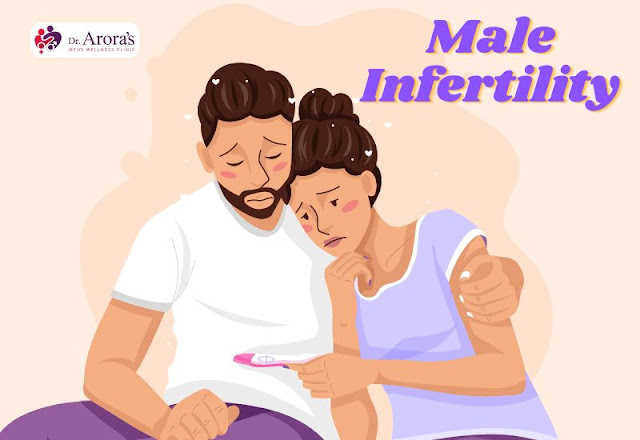Male Infertility: What Is It? Can It Be Treated?
Introduction
In today's world, the topic of infertility
is often associated with women, but the truth is that male infertility is a
common issue that affects many couples trying to conceive. While it may not be
openly discussed, male infertility can have a significant impact on a couple's
ability to have a child. In this article, we will explore what male infertility
is, its causes, and the available treatment options. By understanding the
factors contributing to male infertility and seeking appropriate treatment,
couples can increase their chances of starting a family.
1: Understanding Male Infertility
Male infertility refers to the inability of a man to impregnate a woman after regular, unprotected intercourse for a certain period of time, typically one year. It can be caused by various factors, including problems with sperm production, function, or delivery. In some cases, a man may produce no sperm at all, while in others, the sperm may be abnormal or unable to reach the woman's egg. There are many medical issues that are also responsible for infertility like ED. The severity of Erectile Dysfunction(ED) may increase every time the risk of male infertility. In fact, 1 in 6 males with infertility may have ED or other sexual problems
2: Common Causes of Male
Infertility
There are many causes of male
infertility, including:
Varicocele: This is a condition
characterized by enlarged veins in the scrotum, which can lead to reduced sperm
production or quality.
Hormonal Imbalances: Hormonal imbalances,
such as low testosterone levels or problems with the hypothalamus or pituitary
gland, can affect sperm production.
Genetic Disorders: Certain genetic
conditions, such as Klinefelter syndrome or cystic fibrosis, can cause
infertility by interfering with sperm production or transport.
Testicular Injury: Trauma or injury to the
testicles can result in decreased sperm production or impaired sperm function.
Infections: Infections, such as sexually
transmitted infections or urinary tract infections, can affect sperm production
or damage the reproductive organs.
3: Lifestyle Factors and Male
Infertility
In addition to medical conditions, certain
lifestyle factors can contribute to male infertility:
Smoking: Smoking tobacco has been linked to
decreased sperm count, motility, and overall sperm health.
Alcohol and Drug Use: Excessive alcohol
consumption and drug use, including anabolic steroids, can negatively impact
sperm production and quality.
Obesity: Overweight or obese can
affect hormone levels and sperm production in men.
Stress: Chronic stress can disrupt hormone
balance and impair sperm production.
Exposure to Environmental Factors:
Prolonged exposure to environmental toxins, such as pesticides, heavy metals,
or radiation, may harm sperm production and function.
4: Seeking Diagnosis and Treatment
When a couple experiences difficulty conceiving, it is important for both partners to undergo a comprehensive evaluation. For men, this usually involves a physical examination, medical history review, and semen analysis. Additional tests, such as hormone testing, genetic screening, or imaging studies, may be recommended based on the initial finding
5: Treatment Options for Male Infertility
The treatment of male infertility depends
on the underlying cause and may include:
Medications: Certain medications can help
address hormonal imbalances, improve sperm production, or treat infections that
affect fertility.
Surgery: Surgical interventions may be
necessary to correct anatomical abnormalities, such as varicoceles or blockages
in the reproductive tract.
Assisted Reproductive Techniques: In vitro
fertilization (IVF), intracytoplasmic sperm injection (ICSI), or other assisted
reproductive techniques can be used to bypass fertility issues and increase the
chances of a successful pregnancy.
Lifestyle Modifications: Making positive
lifestyle changes, such as quitting smoking, reducing alcohol consumption,
maintaining a healthy weight, managing stress levels, and avoiding exposure to
environmental toxins, can significantly improve fertility outcomes.
Counseling and Support: Infertility can be
emotionally challenging for both partners. Seeking counseling or joining
support groups can provide valuable guidance and emotional support throughout
the fertility journey.
Alternative Therapies: Some men explore
alternative therapies, such as acupuncture or herbal supplements, to improve
fertility. While research on their effectiveness is limited, some individuals
find them beneficial.
6: Coping with Male Infertility
Dealing with male infertility can be
emotionally and psychologically distressing. It is important for couples to
communicate openly, express their feelings, and support each other throughout
the process. Seeking professional counseling or therapy can be instrumental in
coping with challenges and maintaining a healthy relationship.
7: The Importance of Seeking
Professional Help
When faced with infertility, it is crucial
for couples to seek the guidance of healthcare professionals who specialize in
reproductive medicine. Fertility specialists, urologists, and reproductive
endocrinologists have the expertise to diagnose the underlying causes of male
infertility and recommend appropriate treatment options.
8: The Role of Emotional Support
Infertility can place immense emotional
strain on couples. Seeking support from friends, family, or support groups can
provide an outlet for sharing experiences and finding solace. Open
communication, empathy, and understanding within the relationship are vital for
navigating the challenges of male infertility together.
9: The Journey to Parenthood
The journey to parenthood may be
challenging for couples facing male infertility, but it is important to
remember that there are various treatment options available. With advances in
medical science and reproductive technologies, the chances of achieving a
successful pregnancy have significantly improved over the years. Patience,
perseverance, and a positive mindset can make a significant difference in
navigating the path to parenthood.
10: Conclusion
Male infertility is a prevalent issue that
can significantly impact a couple's ability to conceive. Understanding the causes,
seeking a timely diagnosis, and exploring appropriate treatment options can
greatly increase the chances of overcoming male infertility. By addressing
lifestyle factors, seeking professional help, and maintaining emotional
support, couples can embark on the journey to parenthood with hope and
resilience. Remember, every infertility journey is unique, and with
determination and the right support, dreams of starting a family can come true.




Comments
Post a Comment